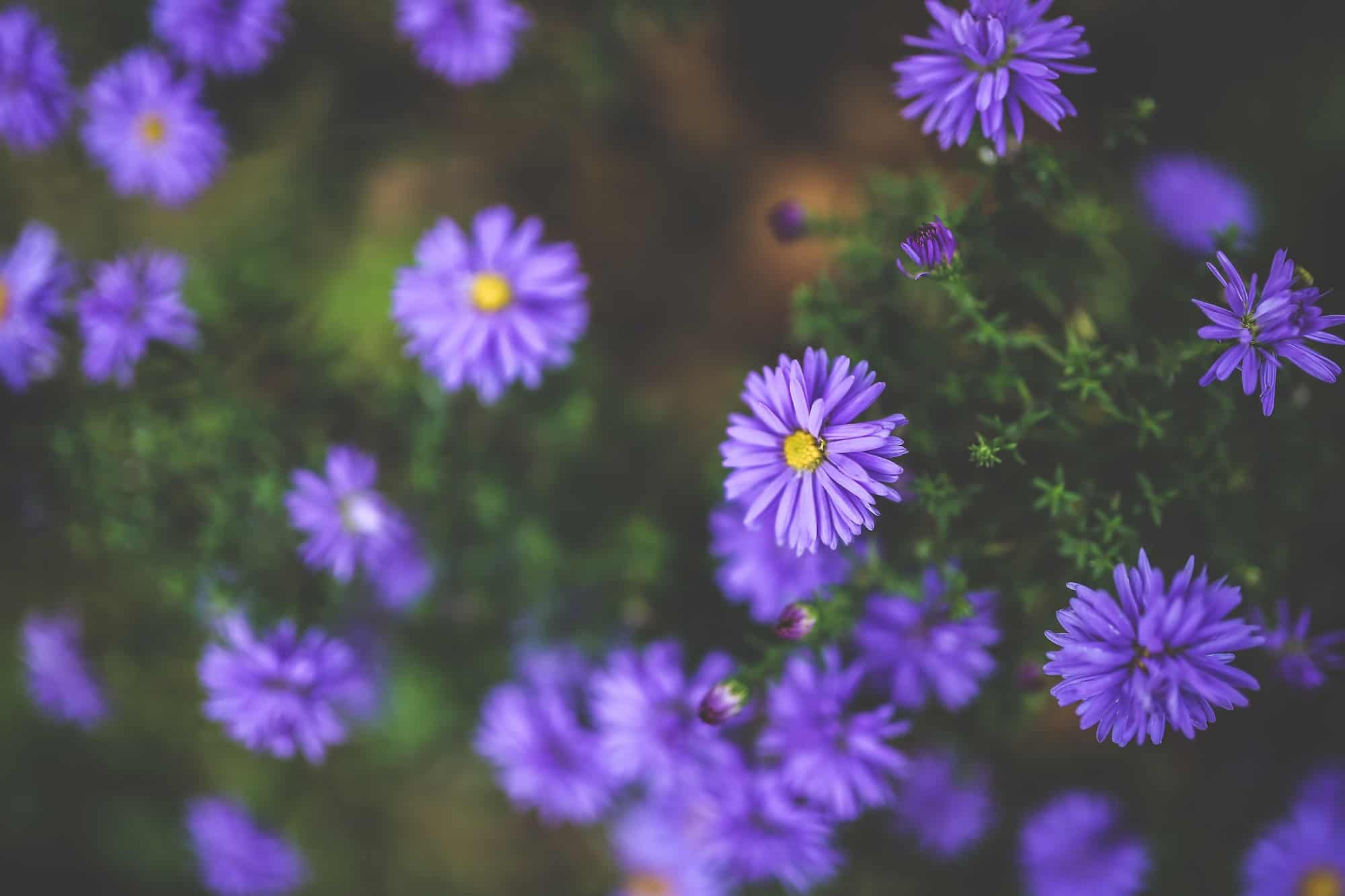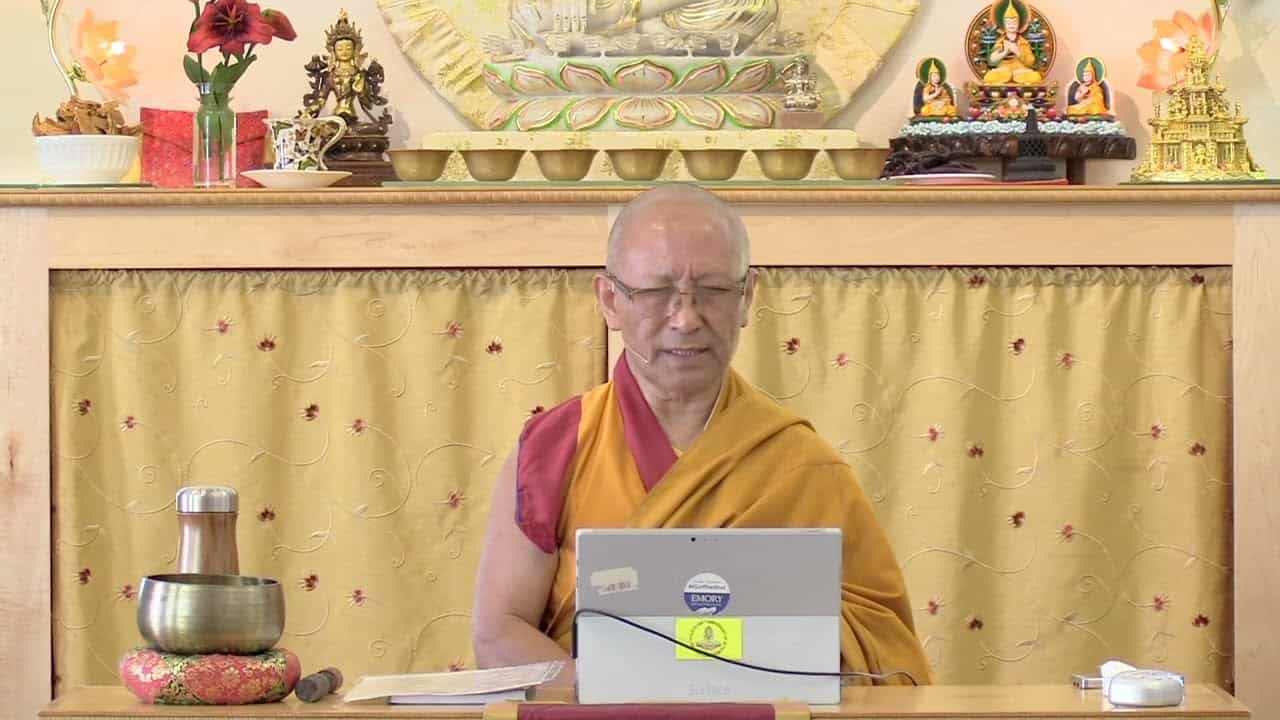Seven-limb Prayer
Seven-limb Prayer
Venerable Chodron explains the purpose and the practice of the seven-limb prayer.
- Prostrating and making offerings
- Purifying with the four opponent powers
- Rejoicing and recognizing the value of the Three Jewels
- Requesting teachings and appreciating our good fortune
- Dedicating the merit for the benefit of all
The Seven Limb Prayer is done for two purposes. One is to purify negative karma, and the second is to create positive potential. We need to do these two things: purify and create merit. I say positive potential instead of merit because I think it’s a better translation. We need to do these in order to prepare our minds for meditation and in order to gain the realizations of the path.
Often our mind is compared to a field. Before you can grow crops in a field, you have to take out the rocks and the broken glass and all the garbage in the field—so that’s like purifying. In our own mind, we have to take out the negative karma. Then going back to the field analogy: again, before we can grow crops, we have to put an irrigation system in, we have to fertilize it, we have to prepare and then enrich the ground.
This analogy corresponds to preparing and enriching our mind through creating merit or positive potential. Then, once the field is prepared, you can plant the seeds. Planting the seeds is like listening to teachings; once the seeds are planted then they get nourished and they can grow. Nourishing the seeds is meditation and growing is the process of gradually gaining realizations of the path.
The first of the seven limbs:
Reverently I prostate with my body, speech, and mind
This is the limb of prostration: it purifies pride and arrogance, and it creates merit because we develop respect for others’ good qualities.
The second limb:
And present clouds of every type of offering, actual and mentally transformed.
This is the limb of offering. Actual offerings are what we put on the shrine, so we might make a little table here where we can put offerings. You can offer food and flowers and water bowls, whatever you like. The mentally transformed offerings are in our mind. We imagine the whole sky full of beautiful things, and the whole earth spread out with beautiful things, and we offer all of that in our mind. Offering purifies miserliness and it creates positive potential because we take delight in being generous.
The third limb:
I confess all my negative actions accumulated since beginningless time
This is the limb of confession. There are four parts with this limb:
- We regret our mistakes.
- We make a determination to avoid them again.
- We restore the relationship with whoever it was that we created negative actions in relation to.
So, if we created negative actions with holy beings, we restore it by taking refuge. If we created negative actions in terms of ordinary sentient beings, we restore a good feeling by generating love, compassion and bodhicitta.
- Some kind of remedial action, which could be meditating, printing dharma books, offering service, reading dharma books or any kind of virtuous action.
When we do this third limb of confession, we’re purifying our mind that likes to keep all our faults hidden. In psychology they call this denial. The mind that likes to pretend we didn’t make any mistakes and to hide our mistakes: that’s the mind that we’re purifying because here we’re being open, honest and frank and admitting we made mistakes. That’s very psychologically healthy as well as spiritually healthy, and it creates the good karma of setting down all of our guilt and our psychological burden and restoring our mind to a happy state. Because when we’ve made mistakes, if we don’t purify them then we walk around with this heavy burden on our heart, and that’s quite exhausting.
Then the fourth limb:
And rejoice in the virtues of all holy and ordinary beings.
This is the limb of rejoicing. Here, we rejoice in all the good qualities, all the positive actions, of holy beings, the arhats, buddhas and bodhisattvas, and in ordinary beings, in everybody we see around us. This rejoicing purifies jealousy, so instead of being jealous of others’ virtue, we appreciate it, and it creates positive potential because we take delight in others’ virtuous actions. By doing that, it’s like we create the positive potential of doing those same actions even though we haven’t done them.
That’s why they say rejoicing is the lazy person’s way to create a lot of good karma! Because instead of doing all the actions yourself, you sit and rejoice, but everybody else did them. It’s not an excuse for not doing them yourself, but it’s a really nice practice to do that makes your mind feel very happy when you just sit and think about all the positive things other people have done. Instead of sitting and thinking about all the negative things on the six o’clock news, you sit around and think about all the positive things people have done, and then your mind feels quite happy.
Then the fifth limb:
Please remain until cyclic existence ends
This is asking the buddhas and bodhisattvas and our teachers to please remain, and not just go into their own nirvana and abandon us. It purifies the mind that doesn’t appreciate the existence of the Buddha, Dharma, Sangha and our teachers, and it purifies the mind that has criticized them. And it creates merit because we’re recognizing the value of the Buddha, Dharma, Sangha and our teachers, and asking them to please remain so that we can have contact with them. This also stops us from taking them for granted.
Then the sixth limb:
And turn the wheel of dharma for sentient beings.
This is requesting teachings, and this purifies the mind that has avoided going to Dharma teachings, or has criticized Dharma teachings, or the mind that takes our teachers and their teachings for granted. And it creates merit by requesting teachings, and this will enable us to actually receive teachings in the future.
Now, these two limbs of asking the holy beings to remain and then asking them to give teachings are very important, because we often have the tendency to take our good fortune for granted, and we don’t appreciate the fact that we live in a place where we have access to the Buddhadharma and to teachers. When we take this all for granted then we don’t make an effort to go to teachings and retreats, and we don’t make an effort to learn the Dharma.
Our minds become lazy because we think, “Well, there are so many teachers around, there are so many temples, there are so many books, and I’m tired tonight! I don’t want to go to teachings. I’m going to stay home and watch tv. I’ll go next week!” And then next week comes: “Oh, my little toe hurts! I can’t go to teachings. But there are so many temples and teachings, so I’ll go later.”
Pretty soon our whole life goes by and we’ve never received teachings, we’ve never done any practice because we’ve taken our fortune for granted. It’s extremely important that we appreciate the fortune that we have and don’t take it for granted, because if we don’t appreciate it we’re going to lose it.
Think about China before 1949. There were a lot of temples and teachers, and then the Communists took control and the temples got destroyed, the teachers were forced to disrobe, so many Buddhist books were burned. The destruction of the Dharma that took place in China after the Communist take-over was horrible. Now, what happens if we live in a country like that? You might have so much spiritual longing and really want to practice, but you can’t do it because you’re going to get arrested and thrown in prison. Or you can’t do it because there are no teachers or Dharma books or temples around. That’s not a very happy situation to live in if you have some kind of spiritual longing. That’s why it’s really important that we don’t take our fortune for granted and we really take advantage of it.
I really say this here in Singapore because you have a lot of opportunities. Don’t just spend your time working overtime and trying to get a lot of money and watching TV. At the end of the day you’re going to regret it, because all that stuff won’t bring you lasting happiness. Whereas if you put some time and energy into getting teachings and practicing, that will really help you in your life and bring you happiness. So, it’s very important to appreciate this.
The seventh limb is dedication:
I dedicate all the virtues of myself and others to the Great Enlightenment.
So, all the virtues that we’ve created by doing the previous practices, we are dedicating so that they ripen into the enlightenment of ourselves and others.
Venerable Thubten Chodron
Venerable Chodron emphasizes the practical application of Buddha’s teachings in our daily lives and is especially skilled at explaining them in ways easily understood and practiced by Westerners. She is well known for her warm, humorous, and lucid teachings. She was ordained as a Buddhist nun in 1977 by Kyabje Ling Rinpoche in Dharamsala, India, and in 1986 she received bhikshuni (full) ordination in Taiwan. Read her full bio.


